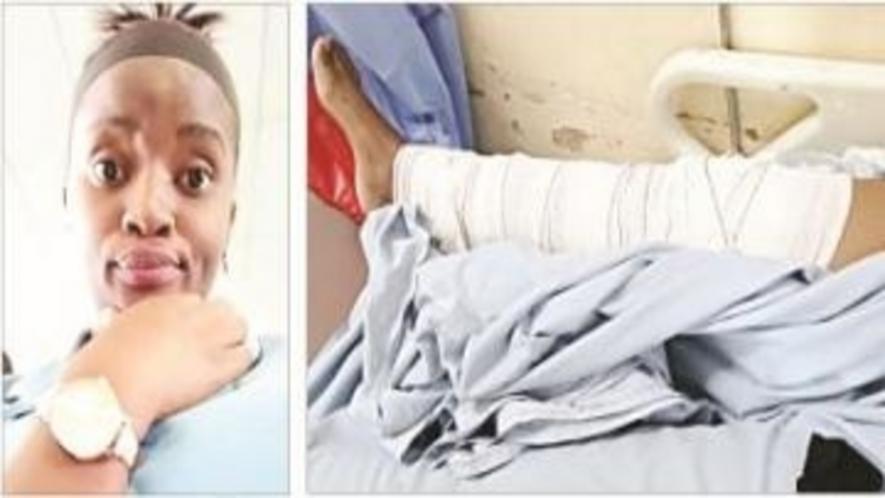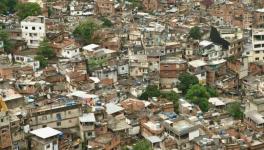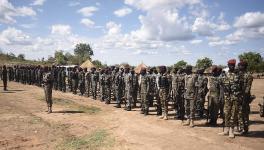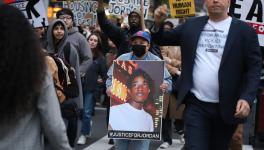Police in Swaziland Violently Repress Student Protest

On November 4, 20-year-old Phephile Sifundza was injured with a rubber bullet to her leg after police opened fire at university students protesting the non-payment of their monthly allowances by the Swaziland government.
Swaziland’s Southern Africa Nazarene University (SANU) has been closed indefinitely after the police attacked students who were demanding the allowances owed to them by the government.
20-year-old Phephile Sifundza, a student who was not part of the protest, is reported to have been shot in the leg with a rubber bullet after clashes erupted on November 4, when the police forcefully cleared the protesting students from the campus.
The students are demanding that the government release their monthly entitlements that have not been paid since August. In a country where 70% of the population lives below the poverty line of USD 2 a day, the government’s failure to pay the student allowances effectively denies a majority of the country’s youth access to university education.
In September, the university students who had been boycotting classes in protest, resumed attendance after being assured by the government that their monthly allowance would be doubled and paid within 30 days. However no payments have been made yet.
On October 31, the SANU students’ body issued a statement declaring that they would boycott classes again, demanding the “immediate release of book, practical and monthly allowances, scholarship for all students admitted at the institution and allowance increment informed by the students’ economic needs.”
Calling for the “deepest unity” among the students in this struggle for access to university education, the statement added that “those who don’t want to protest should remain at home,” and not attend classes.
The next day, on November 1, a large number of students gathered at a demonstration in the university and marched to the administration, where they were asked to submit a written complaint about their grievances.
This caused much outrage as the student body had not only written numerous letters to the administration in the past, but also approached the ministry of labor and social security. The ministry’s response was that the government was cash-strapped and could not afford the allowances.
However, there never appears to be a dearth of resources for the indulgences of king Mswati III, the last absolute monarch in Africa. He appoints the government and the members of the parliament – either directly, or indirectly by controlling who can and cannot contest the elections through his network of loyal tribal chiefs.
Controlling over 60% of the country’s economy, with no accountability either to the population or to the parliament which he can dissolve at will, the King has amassed a fortune. He owns at least 13 palaces, a fleet of expensive cars and motorbikes, and two private aircraft, one which is customized with VIP upgrades worth USD 30 million.
As the preparations of the students’ agitation were underway, Mswati bought 20 Rolls Royce cars worth USD 15 million for his wives.
The outraged student body said in its statement, “Every day, the regime proves that it is incapable of governing and thus the ultimate practical solution left to the people of Swaziland is to dismantle.. [this] system of government and create a free and a democratic country. To this end, the SRC calls for unity among students in solidarity with each other.”
However, on the day of the boycott, a minority of the better-off students who were self-sponsored and did not need allowances were attending classes. This led to a confrontation in which the SANU Student Representative Council (SRC) secretary general, Colani Khulekani Maseko, sustained injuries to his arm and was hospitalized.
Meanwhile, more students said they would join the action on campus. These included graduates whose certificates have been withheld by the university on the grounds that they still owe a portion of the fee.
As the student agitation continued, on November 4, students lit small fires around which they danced, singing songs resistance. The Office of Registrar then issued a memorandum informing the students that the University’s Senate had decided in a meeting to shut down the university indefinitely due to the agitation.
“That is where all hell broke loose and the students clashed with the law enforcers who were trying to drive them out of the institution,” the Times of Swaziland reported, quoting an unnamed source.
After the students were forced out by the armed police, they gathered outside the campus and started a fire on the main road. The police began firing at students, in the course of which Sifundza, a second-year student of the Medical Laboratory Science, was injured with a rubber bullet to her leg.
“In a moment, I was on the ground and I realized that I was hurt. I tried to call out for help but everyone was running around,” she told the Swazi Observer. It was only after the chaos – in which students were running helter-skelter under police fire – had subsided, that her fellow students could rush her to a hospital.
Get the latest reports & analysis with people's perspective on Protests, movements & deep analytical videos, discussions of the current affairs in your Telegram app. Subscribe to NewsClick's Telegram channel & get Real-Time updates on stories, as they get published on our website.
























